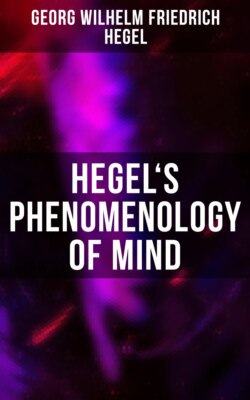Hegel's Phenomenology of Mind

Реклама. ООО «ЛитРес», ИНН: 7719571260.
Оглавление
Georg Wilhelm Friedrich Hegel. Hegel's Phenomenology of Mind
Hegel's Phenomenology of Mind
Table of Contents
Preface: On Scientific Knowledge
Introduction
A. Consciousness
I. Certainty at the Level of Sense-Experience — The “This”, And “Meaning”
II. Perception: Or Things and Their Deceptiveness3
III. Force and the Understanding-The World of. Appearance and the Supersensible World6
B. Self-Consciousness10
IV. The Truth which Conscious Certainty of Self Realizes
A. Independence and Dependence of Self-Consciousness Lordship and Bondage
B. Freedom of Self-Consciousness Stoicism: Scepticism: The Unhappy Consciousness
C. Free Concrete Mind24
Aa. Reason25
V. Reason’s Certainty and Reason’s Truth
A. Observation as a Process of Reason
A (1). Observation of Nature
A (2) Observation of Organic Nature
B. Observation of Self-Consciousness in its Pure Form and in its Relation to External Reality — Logical and Psychological Laws
C. Observation of the Relation of Self-Consciousness. To its Immediate Actuality — Physiognomy and Phrenology
Observation of the Relation of Self-Consciousness To its Immediate Actuality — Physiognomy and Phrenology.38
B. The Realization of Rational Self-Consciousness. Through its Own Activity
A. Pleasure and Necessity
B. The Law of the Heart, and the Frenzy. Of Self-Conceit
C. Virtue and the Course of the World
C. Individuality, which Takes Itself to Be Real. In and for Itself
A. Society as a Herd of Individuals: Deceit: "Actual Fact"
B. Reason as Lawgiver
C. Reason as Testing Laws
VI. Spirit53
A. Objective Spirit54 — The Ethical Order55
A. The Ethical World: Law Human and Divine: Man and Woman
B. Ethical Action. Knowledge, Human and Divine. Guilt and Destiny
C. The Condition of Right or Legal Status
B. Spirit in Self-Estrangement — The Discipline Of Culture
I. The World of Spirit in Self-Estrangement
A. Culture and its Realm of Actual Reality77
B. Belief and Pure Insight87
II. Enlightenment96
A. The Struggle of Enlightenment with. Superstition98
B. The True Result of Enlightenment107
III. Absolute Freedom and Terror109
C. Spirit in the Condition of Being Certain of Itself: Morality
A. The Moral View of the World
B. Dissemblance
Dissemblance114
C. Conscience: The “Beautiful Soul”: Evil and the Forgiveness of it
VII. Religion
Religion in General
A. Natural Religion
Natural Religion127
A. God as Light128
B. Plants and Animals as Objects of Religion133
C. The Artificer135
B. Religion in the Form of Art141
A. The Abstract Work of Art
B. The Living Work of Art
C. The Spiritual Work of Art
C. Revealed Religion168
VIII. Absolute Knowledge183
Отрывок из книги
Georg Wilhelm Friedrich Hegel
System of Science
.....
VIII. Absolute Knowledge
As regards truth in matters of historical fact-to deal briefly with this subject — so far as we consider the purely historical element, it will be readily granted that they have to do with the sphere of particular existence, with a content in its contingent and arbitrary aspects, features that have no necessity. But even bare truths of the kind, say, like those mentioned, are impossible without the activity of self-consciousness. In order to know any one of them, there has to be a good deal of comparison, books must be consulted, or in some way or other inquiry has to be made. Even in a case of direct perception, only when we know it along with the reasons behind it, is it held to be something of real value; although it is merely the naked fact itself that we are, properly speaking, supposed to be concerned about.
.....